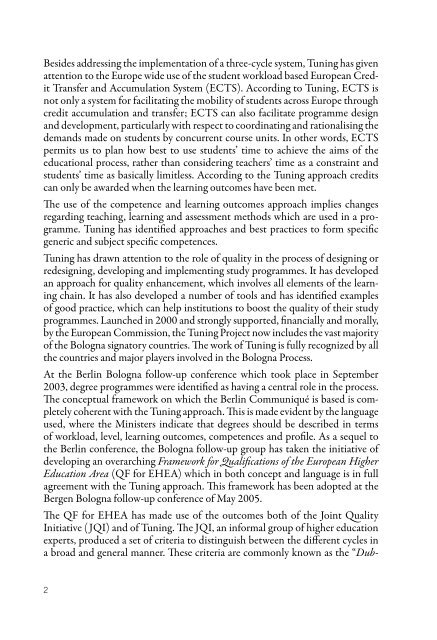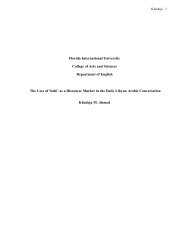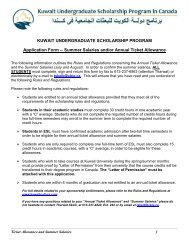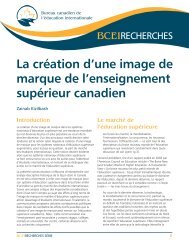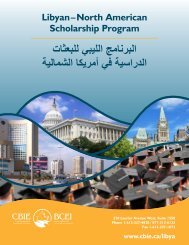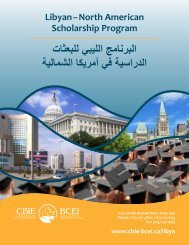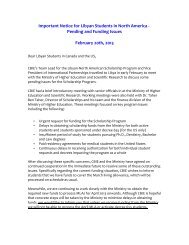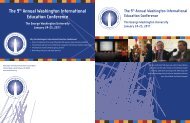Creating a New Historical Perspective: EU and the Wider World ...
Creating a New Historical Perspective: EU and the Wider World ...
Creating a New Historical Perspective: EU and the Wider World ...
You also want an ePaper? Increase the reach of your titles
YUMPU automatically turns print PDFs into web optimized ePapers that Google loves.
Besides addressing <strong>the</strong> implementation of a three-cycle system, Tuning has given<br />
attention to <strong>the</strong> Europe wide use of <strong>the</strong> student workload based European Credit<br />
Transfer <strong>and</strong> Accumulation System (ECTS). According to Tuning, ECTS is<br />
not only a system for facilitating <strong>the</strong> mobility of students across Europe through<br />
credit accumulation <strong>and</strong> transfer; ECTS can also facilitate programme design<br />
<strong>and</strong> development, particularly with respect to coordinating <strong>and</strong> rationalising <strong>the</strong><br />
dem<strong>and</strong>s made on students by concurrent course units. In o<strong>the</strong>r words, ECTS<br />
permits us to plan how best to use students’ time to achieve <strong>the</strong> aims of <strong>the</strong><br />
educational process, ra<strong>the</strong>r than considering teachers’ time as a constraint <strong>and</strong><br />
students’ time as basically limitless. According to <strong>the</strong> Tuning approach credits<br />
can only be awarded when <strong>the</strong> learning outcomes have been met.<br />
The use of <strong>the</strong> competence <strong>and</strong> learning outcomes approach implies changes<br />
regarding teaching, learning <strong>and</strong> assessment methods which are used in a programme.<br />
Tuning has identified approaches <strong>and</strong> best practices to form specific<br />
generic <strong>and</strong> subject specific competences.<br />
Tuning has drawn attention to <strong>the</strong> role of quality in <strong>the</strong> process of designing or<br />
redesigning, developing <strong>and</strong> implementing study programmes. It has developed<br />
an approach for quality enhancement, which involves all elements of <strong>the</strong> learning<br />
chain. It has also developed a number of tools <strong>and</strong> has identified examples<br />
of good practice, which can help institutions to boost <strong>the</strong> quality of <strong>the</strong>ir study<br />
programmes. Launched in 2000 <strong>and</strong> strongly supported, financially <strong>and</strong> morally,<br />
by <strong>the</strong> European Commission, <strong>the</strong> Tuning Project now includes <strong>the</strong> vast majority<br />
of <strong>the</strong> Bologna signatory countries. The work of Tuning is fully recognized by all<br />
<strong>the</strong> countries <strong>and</strong> major players involved in <strong>the</strong> Bologna Process.<br />
At <strong>the</strong> Berlin Bologna follow-up conference which took place in September<br />
2003, degree programmes were identified as having a central role in <strong>the</strong> process.<br />
The conceptual framework on which <strong>the</strong> Berlin Communiqué is based is completely<br />
coherent with <strong>the</strong> Tuning approach. This is made evident by <strong>the</strong> language<br />
used, where <strong>the</strong> Ministers indicate that degrees should be described in terms<br />
of workload, level, learning outcomes, competences <strong>and</strong> profile. As a sequel to<br />
<strong>the</strong> Berlin conference, <strong>the</strong> Bologna follow-up group has taken <strong>the</strong> initiative of<br />
developing an overarching Framework for Qualifications of <strong>the</strong> European Higher<br />
Education Area (QF for EHEA) which in both concept <strong>and</strong> language is in full<br />
agreement with <strong>the</strong> Tuning approach. This framework has been adopted at <strong>the</strong><br />
Bergen Bologna follow-up conference of May 2005.<br />
The QF for EHEA has made use of <strong>the</strong> outcomes both of <strong>the</strong> Joint Quality<br />
Initiative ( JQI) <strong>and</strong> of Tuning. The JQI, an informal group of higher education<br />
experts, produced a set of criteria to distinguish between <strong>the</strong> different cycles in<br />
a broad <strong>and</strong> general manner. These criteria are commonly known as <strong>the</strong> “Dub-


